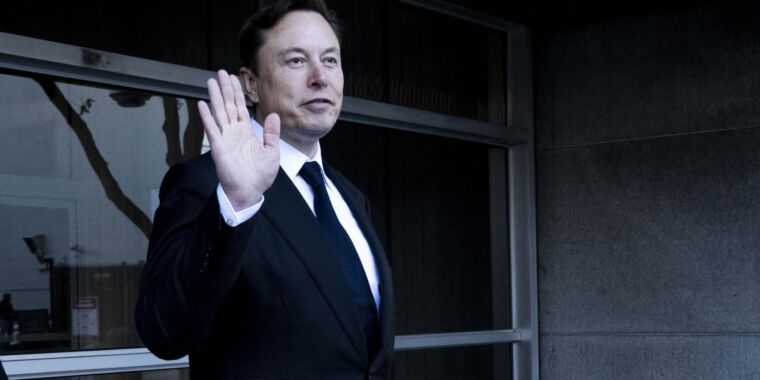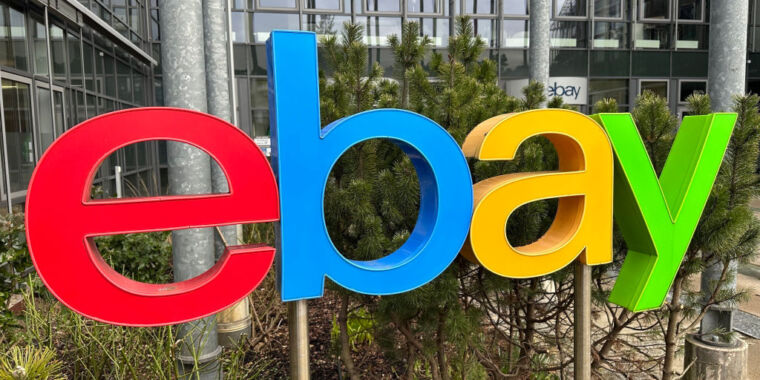Getty Images | Bloomberg
Tesla shareholders have re-approved CEO Elon Musk’s $44.9 billion pay package, the company announced today. “Our stockholders have approved the ratification of the 100 percent performance-based stock option award to Elon Musk that was approved by stockholders in 2018,” Brandon Ehrhart, Tesla’s general counsel and corporate secretary, announced at Tesla’s annual shareholder meeting.
Ehrhart also said that shareholders approved a corporate move from Delaware to Texas, and the re-election of board members James Murdoch and Kimbal Musk (Elon Musk’s brother). While the official announcement was made at the shareholder meeting late in the day on Thursday, Musk revealed that the yes votes were winning in a social media post last night.
“Both Tesla shareholder resolutions are currently passing by wide margins!” Musk wrote, referring to the pay vote and the move from Delaware to Texas. His post included charts indicating that both shareholder resolutions had more than enough yes votes to surpass the “guaranteed win” threshold.
The results were preliminary at the time Musk announced them. Voters still had the option of changing their votes.
Under a settlement with the Securities and Exchange Commission, Musk is required to get pre-approval from a Tesla securities lawyer for social media posts that may contain information material to the company or its shareholders. Tesla today submitted an SEC filing containing a screenshot of Musk’s X post describing the preliminary results.
Legal uncertainty remains
Musk’s pay plan was previously nullified by a judge’s ruling. The vote isn’t the last word on the pay package that was once estimated to be worth $56 billion and more recently valued at $44.9 billion based on Tesla’s stock price. The pay plan was thrown out by a Delaware Court of Chancery ruling in January 2024 after a lawsuit filed by a shareholder.
Judge Kathaleen McCormick ruled that the pay plan was unfair to Tesla’s shareholders, saying the proxy information given to investors before 2018 was materially deficient. McCormick said that “the proxy statement inaccurately described key directors as independent and misleadingly omitted details about the process.”
As the Financial Times wrote, there is still legal uncertainty even after the shareholder vote:
In asking shareholders to approve of the same 2018 pay package that was nullified by the Delaware Court of Chancery in January, Tesla is relying on a legal principle known as “ratification,” in which the validity of a corporate action can be cemented by a shareholder vote. Ratification, the company told shareholders in a proxy note earlier this year, “will restore Tesla’s stockholder democracy.”
This instance, however, is the first time a company has tried to leverage that principle after its board was found to have breached its fiduciary duty to approve the deal in the first place.
Even Tesla admits it does not know what happens next. “The [Tesla board] special committee and its advisers noted that they could not predict with certainty how a stockholder vote to ratify the 2018 CEO performance award would be treated under Delaware law in these novel circumstances,” it said in a proxy statement sent to shareholders.
The BBC writes that “legal experts say it is not clear if a court that blocked the deal will accept the re-vote, which is not binding, and allow the company to restore the pay package.”
McCormick may have to make another ruling. “Legal experts say the issue of Musk’s pay will still be decided in Delaware, largely because Musk’s lawyers have assured McCormick that they won’t try to move the case to Texas,” the Associated Press wrote.
New lawsuit challenges re-vote
The re-vote was already being challenged in the same Delaware court that nullified the 2018 vote. Donald Ball, who owns 28,245 shares of Tesla stock, last week sued Musk and Tesla in a complaint that alleges the Tesla “Board has not disclosed a complete or fair picture” to shareholders of the impact of re-approving Musk’s pay plan.
That includes “radical tax implications for Tesla that will potentially wipe out Tesla’s pre-tax profits for the last two years,” the lawsuit said. The Ball lawsuit also alleged that “Musk has engaged in strong-arm, coercive tactics to obtain stockholder approval for both the Redomestication Vote and the Ratification Vote.”
Tesla Board Chairperson Robyn Denholm urged shareholders to re-approve the Musk pay plan, suggesting that Musk could leave Tesla or devote less time to the company if the resolution is voted down.
This article was updated with the final result of the shareholder vote.




